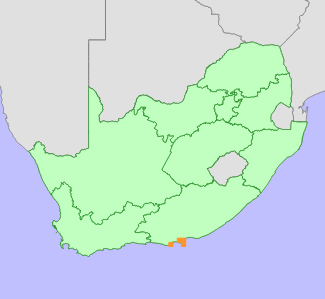|
Scientific Name | Aspalathus recurvispina R.Dahlgren |
Higher Classification | Dicotyledons |
Family | FABACEAE |
National Status |
Status and Criteria | Critically Endangered B1ab(iii)+2ab(iii); C2a(ii) |
Assessment Date | 2008/11/05 |
Assessor(s) | I. Ebrahim, D. Raimondo & A.L. Schutte-Vlok |
Justification | All six locations known through historical records are in areas now transformed to suburbs of Port Elizabeth, and it was thought extinct until a small subpopulation of ± 200 plants was found in a 1.5 ha roadside fragment of natural vegetation in Humewood. This subpopulation is likely to continue declining due to the effects of fragmentation and degradation of the habitat, as well as alien plant invasion. |
Distribution |
Endemism | South African endemic |
Provincial distribution | Eastern Cape |
Range | Port Elizabeth and Cape St Francis. |
Habitat and Ecology |
Major system | Terrestrial |
Major habitats | Algoa Sandstone Fynbos, St Francis Dune Thicket |
Description | Coastal fynbos below 100 m. |
Threats |
| Urban development is an extremely severe threat, all historical collections localities are likely to be extinct and the only known extant subpopulation occurs on a 1.5 ha fragment on a road verge in the suburbs of Port Elizabeth. |
Population |
Population trend | Decreasing |
Notes |
| This species is limited to coastal regions in the Port Elizabeth district. Dahlgren (1988) mentions that the six collections cited in his revision are the only ones known. He further notes that the species 'may be seriously threatened and the habitat should be protected'. |
Assessment History |
Taxon assessed |
Status and Criteria |
Citation/Red List version | | Aspalathus recurvispina R.Dahlgren | CR B1ab(iii)+2ab(iii); C2a(ii) | Raimondo et al. (2009) | |
Bibliography |
Dahlgren, R. 1966. Revision of the genus Aspalathus. II. The species with ericoid and pinoid leaflets. 5. The Aspalathus carnosa, aciphylla, pachyloba, arida, pinguis, spinosa and sanguinea groups and some other groups. Opera Botanica 11(1):7-266.
Dahlgren, R. 1988. Crotalarieae (Aspalathus). In: O.A. Leistner (ed). Flora of southern Africa 16 Fabaceae, Part 3 Papilionoideae, Fascicle 6:1-430. National Botanical Institute, Pretoria.
Goldblatt, P. and Manning, J.C. 2000. Cape Plants: A conspectus of the Cape Flora of South Africa. Strelitzia 9. National Botanical Institute, Cape Town.
Raimondo, D., von Staden, L., Foden, W., Victor, J.E., Helme, N.A., Turner, R.C., Kamundi, D.A. and Manyama, P.A. 2009. Red List of South African Plants. Strelitzia 25. South African National Biodiversity Institute, Pretoria.
|
Citation |
| Ebrahim, I., Raimondo, D. & Schutte-Vlok, A.L. 2008. Aspalathus recurvispina R.Dahlgren. National Assessment: Red List of South African Plants version 2024.1. Accessed on 2026/01/25 |
 Comment on this assessment
Comment on this assessment


